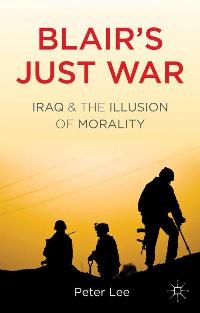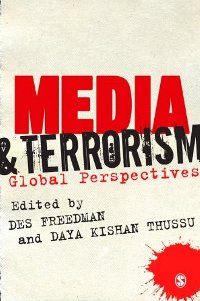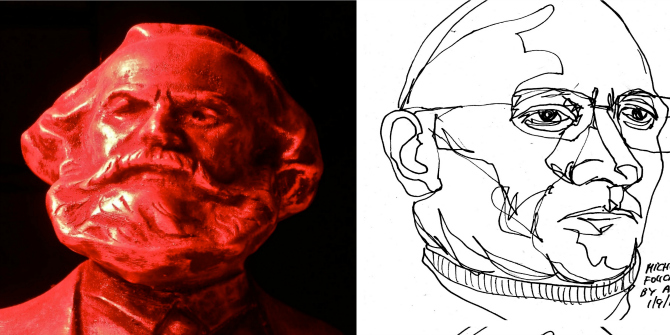Over ten years ago US and British troops moved into Iraq with a mission “to disarm Iraq of weapons of mass destruction, to end Saddam Hussein’s support for terrorism, and to free the Iraqi people.” The LSE Review of Books team have assembled 10 recent must-reads on the War on Terror, Iraq, and the future of the region.
Blair’s Just War: Iraq and the Illusion of Morality by Peter Lee
When is it right to go to war? Peter Lee argues that Tony Blair’s “illusion of morality” evaporated after the 2003 Iraq invasion because the ideas he relied upon were taken out of their historical context. Dr Matthew Partridge is not convinced by the author’s arguments, and finds that exaggerations make the book into a polemic, rather than a serious academic study. Read more…
Stumbling Over Truth: The Inside Story and the ‘Sexed Up’ Dossier, Hutton and the BBC by Kevin Marsh
The 2004 Hutton Report ushered in an age of self-doubt and caution at the BBC. It was also the end of the most extraordinary experiment in news management Britain has ever seen: the decade of Alastair Campbell, the Blair courtier who delivered New Labour’s mission to ‘create the truth’. In Stumbling Over Truth, Kevin Marsh tells of his growing disillusion with the British media’s appetite for holding power to account. An important book for anyone who wants to understand the toe-to-toe confrontations between Tony Blair’s government and the BBC, and the fight to keep BBC journalism independent in the face of unprecedented government pressure. Reviewed by Patrick Weir. Read more…
The Iraq War: A Philosophical Analysis by Bassam Romaya
This book features a critique of key philosophical doctrines that dominate the Iraq war debate: just war theory, humanitarian intervention, democratic realism, and preventive war doctrine. Bassam Romaya evaluates each doctrine and argues that the failure of philosophical discourse on the war derives from misunderstanding the ontological nature of new wars and ignoring the spread of global capitalism that fuels contemporary war violence. Andreas Aagaard Nøhr is disappointed by some weak discussions, but acknowledges that the book is strong as a survey of American thought on Just War Theory. Read more…
Obama and the Middle East by Fawaz Gerges
During his presidential campaign, Barack Obama promised to distance the United States from the neoconservative foreign policy legacy of his predecessor, George W. Bush, and usher in a new era of a global, interconnected world. Years have passed since his inauguration, and the reality of President Obama’s approach is in stark contrast to the ebullient and optimistic image that he originally built up, argues Fawaz Gerges, in his recent book. Reviewed by Corinna Mullin. Read more…
Detained Without Cause: Muslims’ Stories of Detention and Deportation in America after 9/11 by Irum Shiekh
Detained Without Cause is a collection of oral history accounts by six New York based Muslim immigrants who were incarcerated following 9/11. None of these men had any connection to terrorism, and yet as their stories reveal, they were presumed guilty by the arresting officers, the FBI, the court system, the media and their communities. They were held without trial for several years in solitary confinement, in maximum security facilities where their human rights were systematically violated before being deported on trumped up immigration charges. Rory Creedon finds an important book with policy implications relevant far beyond the borders of the US. Read more…
9/11 Ten Years After: Perspectives and Problems by Rachel E. Utley
Ten years on, what have been the principal impacts of the terrorist attacks of 9/11 on the external policies and international outlooks of the world’s major powers? This book investigates a range of international responses to the events of 9/11, to evaluate their consistency over time; to analyse their long-term significance and to consider both their implications for the international security agenda and the prospects for international cooperation in addressing the challenges posed. Jude Howell believes the breadth of the book will ensure that it provides a useful source for researchers and students in the fields of security studies and international relations. Read more…
The Media at War: Communication and Conflict in the Twentieth Century by Susan Carruthers
Susan Carruthers‘ book succeeds in exposing the multifaceted and constantly shifting relationship between the media and war, finds Sasha Jesperson. As perceptions and policies continue to be shaped by the media, Carruthers second edition of The Media at War reminds us to be cautious with our consumption of the news and read between the lines. Read more…
In this book, terrorism, sabotage, and subversion are analyzed to challenge the dominant views that a ‘new conflict’ is now posing unprecedented threats to U.S. homeland security. Since 9/11, the dominant view is that we have entered an era of ‘new conflict’ in which technology has empowered non-state actors who now pose unprecedented and unmanageable threats to U.S. national security. From homegrown and foreign terrorism to the possibility of cyber sabotage and fears of religious subversion, David Tucker challenges every aspect of this ‘new conflict’ argument,writes Maria Kuecken. Read more…
Media and Terrorism: Global Perspectives, edited by Des Freedman and Daya Kishan Thussa
Media and Terrorism: Global Perspectives is an insightful addition to the discussion about how we define legitimate and illegitimate targets in war, and what part the media has played in both the public and policy makers’ ideas about these decisions. Reviewed by Kate Saffin. Read more…
Enemies of the American Way: Identity and Presidential Foreign Policymaking by David Bell Mislan
Why do presidents, when facing the same circumstances, focus on different threats to national security? Enemies of the American Way attempts to answer this question by investigating the role of identity in presidential decision making. The book explains why presidents disagree on what constitutes a threat to the US security via the study of three US presidencies in the 19th century (Cleveland, Harrison, and McKinley). Paul Brighton values the author’s contribution for reminding us of how individual presidents’ own preconceptions shape global foreign policy. Read more…














